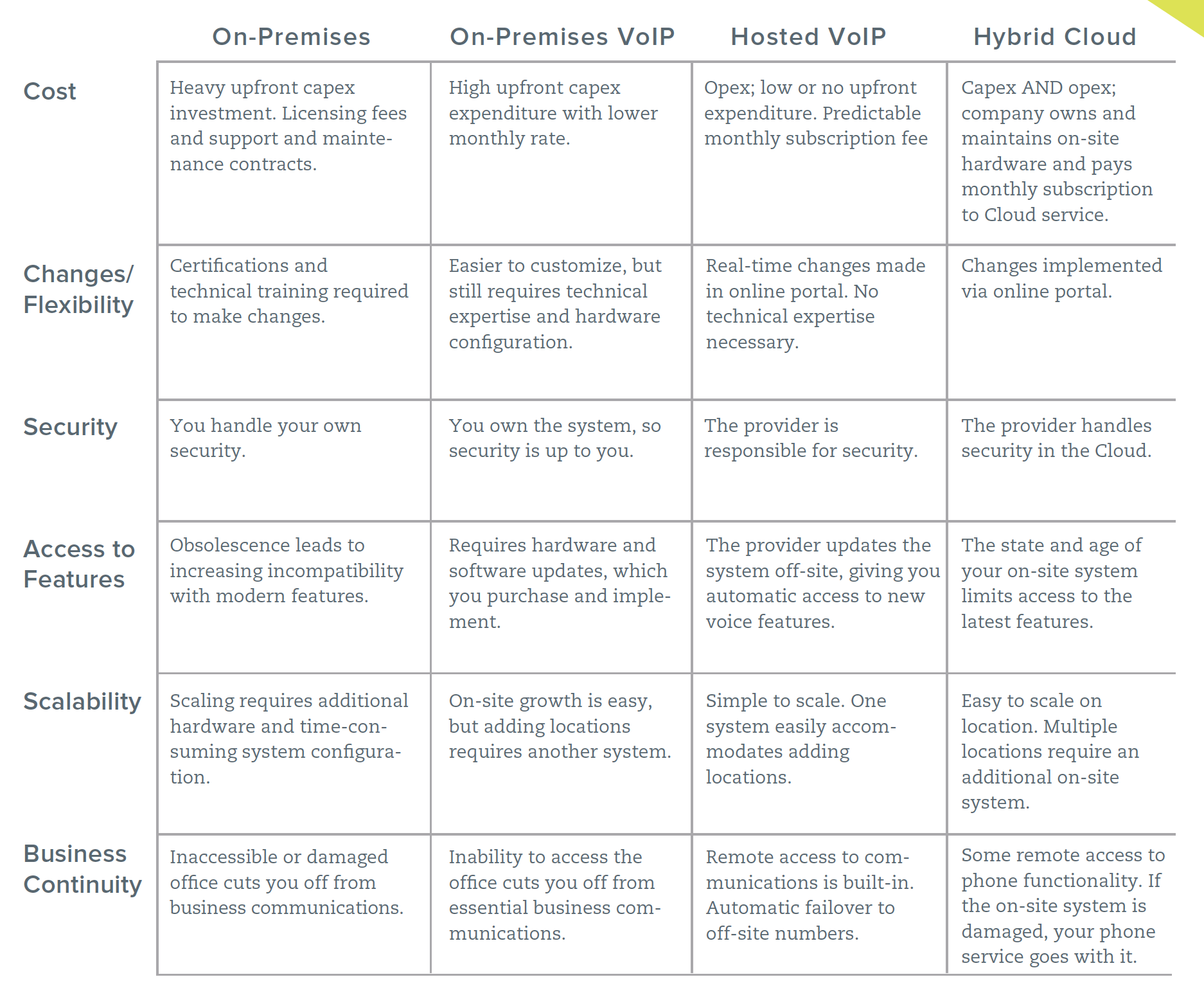Looking for an office phone system?
“You can have any color, as long as it’s black” —Henry Ford
For decades it was, “Do you want a landline system, a landline system, or a landline system?” Yes, there were lots of providers to pick from, but there was was only one option for telecommunications technology—landlines.
But today, answering the question—“what office phone system do you want”—has become more overwhelming. Now there are lots of alternatives to landlines. You’ll hear terms like “On-premises systems,” VoIP,” “Hosted VoIP,” “Cloud,” and “UCaaS.”
Selecting an office phone system is an important decision because it will affect your company in terms of cost and features. But don’t worry. This article will help you navigate the jargon and avoid mistakes. We’ll outline all the important steps to find the perfect office phone system for your company.
#1. Know Your Current Situation
First, you’ll need to make an assessment of your current phone system. A good way to do this is to ask yourself and your employees reflective questions.
- What’s working?
- What’s not working?
- What needs would a new system have to fill?
- Are we only looking for a phone system? Or are we looking for a comprehensive solution? (Like video, contact center, conferencing, chat, text/SMS, desktop integration, a compatible CRM integration, etc.)
- How important is employee mobility?
#2. Know Your Options
Once you figure out what you want in a phone system, you need to consider the different options. Today there are four basic office phone systems offered:
- On-Premises: For decades, on-premises solutions served as the default option for business phone systems. An on-premises (or “legacy”) system is one where your company purchases the system hardware—including servers, switches, etc.—and hosts it at your office location. You’re then responsible for its upkeep, as well as any maintenance or updates.
- VoIP. Voice over Internet Protocol (VoIP) technology transmits calls through the internet (instead of the traditional phone lines). Businesses can purchase an on-premises VoIP system.
- Hosted VoIP. A Hosted VoIP phone system foregoes most on-site equipment. The provider “hosts”—or maintains and updates—the necessary hardware and software off site, delivering voice connectivity remotely.
- Hybrid. Many companies combine their on-site system with a cloud-based VoIP service. It’s a transitional step that usually occurs when a company wants to maintain their investment in an existing on-premises system and enjoy some cloud-based advantages.
#3. Compare Your Options
Now you know the basic definitions of an on-premises, VoIP, Hosted VoIP, and Hybrid phone system, you need to evaluate which option is the best. You’ll need to consider lots of things.
Costs
When you select a phone system, you determine front-end cost and the predictability of your expenses.
You need to realize that the real cost is not always the dollar amount advertised on a website. That’s why it’s important to do a Total Cost of Ownership (TCO) analysis. The hybrid cloud solution is usually the most expensive solution of the four options. And here’s an in-depth TCO comparison between a legacy PBX and Hosted VoIP. Interesting enough, it concludes that they’re comparable.
Although the cost of a PBX system is about the same as a Hosted VoIP solution, there are differences in when you spend that money.
Do you want to spend a lot of money up front? With on-premises and/or VoIP, the upfront costs are high because it’s an investment to buy all that hardware. The hybrid cloud solution is usually the most expensive, combining the upfront costs of the on-premises system with the monthly subscriptions that comes with a cloud-based service. With Hosted VoIP, the upfront costs are significantly lower.
Do you want predictable payments? Because you own the hardware with on-premises, VoIP, and hybrid cloud solutions, you’ll have maintenance fees. And those maintenance fees are unpredictable. But with a Hosted VoIP solution, your expenses are predictable because you just receive a monthly subscription fee. (You don’t own the hardware, so you don’t need to pay for maintenance.)
Security
When you select a phone system, you’re assigning security responsibilities.
Addressing cybersecurity threats is a must these days. And you can help your IT team manage this by contracting out security responsibilities, or you can make it more difficult by adding security responsibilities to their purview. If you select an on-premises and/or VoIP system, your company will inherit more security responsibilities. But if you select Hosted VoIP and hybrid cloud systems, your IT won’t inherit security responsibilities for your telecommunications. Security is the responsibility of your provider.
Features
When you select a phone system, you determine how easy it is to access new features.
On-premises and VoIP often limits your access to features. Because your company purchased and owns the hardware, you’ll need hardware and software updates to access new features.
Hybrid cloud access to features is often limited because both the on-site hardware AND the software have to be compatible and updated, and even then, the system often can’t be adapted to accept the most up-to-date options. Hosted VoIP providers sometimes offer a hybrid solution, but they warn our clients that they won’t have access to all of the cloud features available.
Hosted VoIP systems have easier access to state-of-the-art features because the provider updates systems off-site.
Scalability
When you select an office phone system, you determine how easy it is to scale.
On-premises is difficult to scale because it requires additional hardware and time-consuming system configuration. On-premises VoIP and hybrid cloud solutions are less of a headache because it’s easy to scale on-site growth. But these systems do require money and time if you need to add locations. Hosted VoIP is the easiest for growing on-site and adding new locations. It’s easier to add new locations because one system already accommodates adding new locations.
#4. Choose a System
After comparing the four different types of phone systems, you should be able to conclude which phone system is the best for your company. Here’s the secret:
It’s not what office phone system you should buy, it’s when you should buy a Hosted VoIP solution.
For the same cost, Hosted VoIP will take away the stress of upfront costs and unpredictable maintenance costs. It will also save you the headache and resources of additional security responsibilities and system updates to access new features.
Hosted VoIP also outstrips the other solutions technologically. Holding on to a legacy on-premises system is like holding on to the stymied technology of your old VHS collection.
Even though Hosted VoIP is the goal, today may not be the best time for you to make that leap. If you just invested hundreds of thousands of dollars in an on-premises PBX system in the past two years, continue using that until it ages out. When the time is right, (when the system is outdated, glitching, and falling apart), switch to Hosted VoIP. If you want to make the transition slowly, create a transitional bridge with a hybrid cloud office phone system. However, keep in mind that while this is popular and sounds like a good transition, it often is the most expensive option. It’s a bit of a Frankenstein’s monster as far as telecommunications go.
Selecting a Telecommunications Provider
Now that you’ve decided on an office phone system, you need to find the best provider. This is another important decision, and there are dozens of providers to sift through. If you’re ready to move on to this next step, access our Hosted Buyer’s Guide ebook. It includes more details on what’s discussed on this article, outlines the steps for finding the best providers, and it even includes an excellent template for provider comparisons.
Try Jive’s Office Phone Systems
Jive Communications leads the Hosted VoIP industry in customer support and reliability. With all-inclusive features, complete control of its platform, and eleven datacenters distributed worldwide providing redundant service, Jive sets the pace for the Hosted VoIP and Unified Communications industry.


